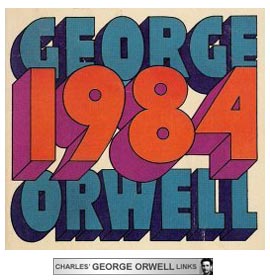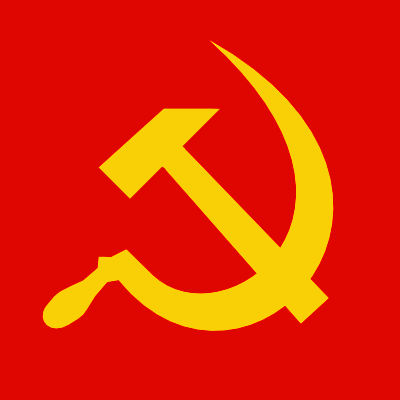As the title suggests I am going to focus on a rather controversial issue: totalitarianism. I am from Bulgaria, once under USSR communist influence, but now a democratic country (at least that's what we believe). I have never lived in communism ( if we don't count those 5 months since I was born and before communism in Bulgaria ended but I don't really have any valuable memories from that time) but my parents and grandparents have. And all I hear is: "Oh, it was safer, people were equal, there was no poverty and unhappiness". To what extent that was true and to what extent were they under powerful propaganda I cannot say and I am not inclined to judge either.
Now on the books. Two novels, which I desperately recommend, have focused on what will happen if totalitarianism not only spread but developped. George Orwell's 1984 presents a utopian world, where The Party controls not only people's lifes, but their thoughts, emotions, and feelings. Big Brother's voice (like in the reality show) sounds in every home, sees everything, and tells people what to do and how to behave. Winston's job is to change history by changing the newspaper's articles depending on the Party's political moves at that time. However, he meets a girl, and together, they try to reveal the roots behind the Party's power over people.
 In Farenheit 451 by Ray Bradbury, Montag lives in a society where books are illegal (IMAGINE THAT!). His job is to burn all books, except those that serve the Party's propaganda. 451 refers to the degrees, at which paper burns. Similarly to Winston, a woman changes his perspective and provokes him to search for answers beneath the ordered totalitarian world.
In Farenheit 451 by Ray Bradbury, Montag lives in a society where books are illegal (IMAGINE THAT!). His job is to burn all books, except those that serve the Party's propaganda. 451 refers to the degrees, at which paper burns. Similarly to Winston, a woman changes his perspective and provokes him to search for answers beneath the ordered totalitarian world.  Both novels are masterpieces, although I personally prefer 1984. It focuses more on the totalitarian regime and its ways to control people, to ensure their subordination, and to prevent acts of disobedience. I have read the novel twice and it always sends shivers through my body. What if we ever reach that state? Can you imagine being told what to think, how to feel, where to go, and how to act...
Both novels are masterpieces, although I personally prefer 1984. It focuses more on the totalitarian regime and its ways to control people, to ensure their subordination, and to prevent acts of disobedience. I have read the novel twice and it always sends shivers through my body. What if we ever reach that state? Can you imagine being told what to think, how to feel, where to go, and how to act...I can't wait to read Ayn Rand's essays on the subjects. She had to fleet the USSR and she expresses a rather firm opinion (that's Ayn Rand after all, she always has a firm opinion!) on totalitarianism and capitalism. I am sure here works would be worth reading.

Strangely enough, like you, I have always made a direct comparison between the two books, meaning when I think of the first I cannot help but think of the other one also. When I read them for the first time I accidentally read them in a consecutive order and found many similarities between the worlds they depict and the world we are living in today. I'd hate to be a pessimist but I think we are pretty much headed in that direction, lack of direct communication leading to estrangement between people is one of the main things we are already witnessing. I hope I'm wrong though.
ReplyDeleteJust a tiny comment about Farenheit 451 - the name Montag, translated from German means Monday. So if we want to go in a lil bit more details and discussions...:)
ReplyDeleteIn relation to the latter, I would definitely suggest reading "WE" by Yevgeny Zamyatin. Moreover, if one is able to read it in its native language, then I must assure, this will be quality time. Apart from the humor and early samples of Science Fiction, I really enojyed the idea of logic and "pure purpose" to be leading motivators in a person's life... until people get bored of this...
ReplyDeleteThanks for the advice, Stavri. You provoked my interest for this book and I will definitely check it out once I finish what I am currently reading.
ReplyDeleteI suppose it is a Russian novel. I will try reading it in the native language but my Russian in not on such a level and I am afraid I am going to miss important points. Nevertheless, it is definitely in my wish list to read
Another very good book discussing similar issues is "Brave New World" by Aldous Huxley. It was written in the 1930s and has one of the most frighteningly authentic depictions of the future (current) society: from human separation in Alpha,Beta,Gamma casts, through recreational sex being an integral part of society, down to alcohol and drug abuse as a form of temporary vacation from reality.
ReplyDeleteIt's 1984-addictive and definitely worth reading.